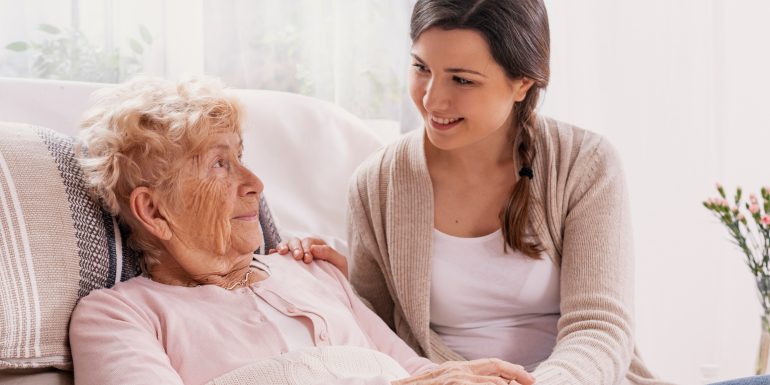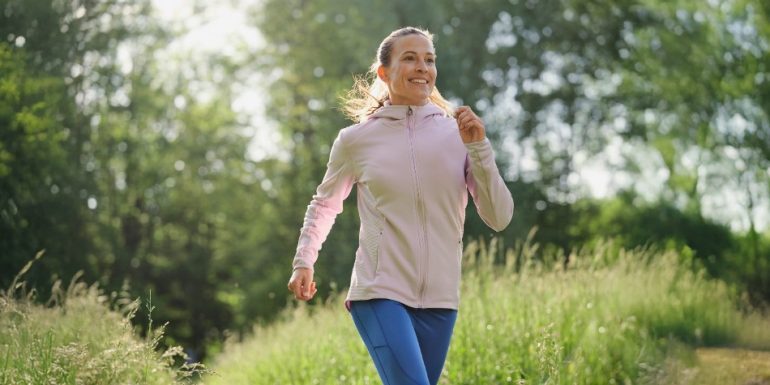
Falls in old age: causes, consequences and prevention
What are the consequences of a fall in old age? How can falls in old age be prevented? How does fall prevention work for elderly patients with Parkinson’s? Are there fall prevention courses? All about falls in old age.
Overview of topics
Falls in old age
Strength, agility and sense of balance decline as we get older. These processes are part of ageing, but you can slow them down by having a healthy lifestyle. Nevertheless, sudden falls in old age are not uncommon: a little carelessness or the wrong movement can quickly throw older people off balance. Around a third of people over 65 suffer a fall every year. When older people fall, minor or serious injuries occur in about 20 percent of cases. Frequent falls in old age have various causes.
Causes of falls in older people
The risk of falling increases with age. The most common reasons for an increased risk of falling in old age are:
- Muscle weakness: as we age, our body loses more and more muscle mass. This reduces muscle strength, for example in the legs, and increases the risk of falling.
- Disorders of the balance organ: in old age, the balance organ in the inner ear reacts more slowly to movements. This results in poor balance and frequent falls.
- Cardiac arrhythmias: falls by older people can be linked to (unrecognised) cardiac arrhythmias (e.g. atrial fibrillation). These disorders lead to circulatory problems and vascular disorders, amongst other things. This can lead to falls in old age.
- Blood pressure: overly low blood pressure also sometimes leads to falls by older people.
- Dementia: dementia and an increased risk of falling go hand in hand. People with dementia often misjudge hazards and therefore take more risks in how they behave than healthy people. For example, they tend to tie their shoes while standing, rather than sitting down. Dementia and falls are also linked because those affected often take certain medications. These include, for example, sedatives or sleep remedies that affect physical strength and performance.
- Parkinson’s disease: if elderly people suffer from Parkinson’s, injuries and falls are not uncommon. The frequent falls by Parkinson’s sufferers are due to balance problems as well as gait and posture problems.
- Side effects of medication: certain medications increase the risk of falls in old age. These include opioids, antipsychotics and antidepressants.
- External factors: sometimes external factors are the cause of falls in old age. This is the case, for example, if someone’s shoes do not fit properly. Clothes that are too loose or too long and poor lighting are also possible causes. Inappropriately placed furniture or decorative elements also increase the risk of falls in the household.
Please note that this is not an exhaustive list.
Falling in old age: consequences
Many falls in old age end in bruises or small skin abrasions. However, some people suffer more serious injuries. Up to 10 out of 100 falls at home lead to lacerations and head injuries. Fractures can also occur, often in the bones of the forearm.
Hip or thigh fractures have far-reaching consequences. In such cases, a longer hospital stay is required. These kinds of falls in old age increase the risk of subsequently needing care or dying prematurely.
People’s mental health also suffers as a result: the fear of another fall prevents many older sufferers from becoming active in their daily lives. As a result, their agility gradually decreases and familiar routines become more difficult.
Please note that, in older people, a fall on the head often leads to a traumatic brain injury or other injuries. For this reason, a medical examination is absolutely essential in such cases – even if the person has no obvious issues.
Fall prevention in old age: measures
Specific measures can help prevent falls in old age. A combination of targeted exercises, balanced nutrition and reviewing your medication makes you more safe. Assistive devices and an adapted living environment also reduce the risk of falling.
Preventing falls in old age: nutrition and exercise
Balanced nutrition plays an important role if you want to avoid falls in old age. As you get older, your body needs more protein. From the age of 65 onwards, consume around 1 gram of protein per kilogram of body weight every day. You should also opt for unprocessed foods and eat several portions of fruit and vegetables every day. Wholegrain products are also a good choice. The food pyramid published by the Swiss Society for Nutrition (SSN) shows what varied nutrition in old age can look like.
It is also important that you drink enough. The SSN recommends that healthy people consume 30 to 35 millilitres of fluid per kilogram of body weight every day. A person weighing 70 kilograms should therefore consume 2.1 to 2.5 litres of fluid. Unsweetened drinks such as water or tea are ideal. You also consume some of the fluid through your nutrition. For certain illnesses, the recommended fluid intake may differ. If you have a fever, diarrhoea or vomiting, for example, you should drink more. If you have heart failure, kidney failure or liver cirrhosis, you should drink less. Discuss the optimal amount to drink with your doctor if you have an illness.
In addition to nutrition, exercise in everyday life is very important. An ideal training plan includes strength, balance and stabilisation exercises as well as moderate and intensive endurance training. It’s best to work out at a gym or attend a course. If you have already had a fall or feel insecure, start with physiotherapy first. There are also various fall prevention exercises for senior citizens that can be done at home:
- Balance training on tiptoe: stand with your feet hip-width apart, lift your heels and balance on tiptoe. While you’re doing this, bend your knees slightly. At the same time, extend your arms upwards and tense your core muscles. Lower your heels and arms again in a controlled manner. Repeat this fall prevention exercise 10 times; do 3 rounds of this.
- Foot and hand coordination: put one foot forward and bend your knee slightly. Extend your arms straight in front of you, palms pointing upwards. Lift the front of your foot and keep your heel on the ground. At the same time, close your hands and open them again when you lower your forefoot. Perform the exercise up to 3 times per leg, with 10 repetitions each.
You can find more tips and a training diary in our “Staying on your feet and getting around safely” brochure. We have also put together practical exercise cards on the topic of “Staying on your feet and getting around safely” and various exercises for building muscle in old age.
Did you know that some physiotherapists offer special courses on “falls and fall prevention in old age”? Specialists provide useful information about exercises to do at home, designing living spaces and organising day-to-day life. Fall prevention can help you reduce the risk factors for falls in old age and increase your mobility.
In the case of dementia and Parkinson’s, it is important to prevent falls by older patients. Physiotherapy plays an important role here: sufferers improve their physical performance, coordination and strength through special exercises.
One of the most important safety tips for dementia and Parkinson’s disease in old age is to avoid tripping hazards in your home. These include slippery carpets or cables lying around. Here, the help of family members is essential.
Fall prevention and medication
Certain medications increase the risk of falls in old age, as they occasionally cause dizziness, light-headedness and imbalances. If there are safe alternatives to these medications, it may be worth trying them out.
Important: if you suffer frequent falls, it is best to talk to your doctor. Sometimes it is necessary to stop or change medication. However, you should never decide this alone – only in consultation with a specialist.
Preventing falls in old age with medical aids
Various aids such as glasses, standing aids and walking aids are available to help older people prevent falls. Generally speaking, a doctor prescribes these remedies. It’s important to use them correctly:
- If you need glasses, visit your ophthalmologist regularly. They will check whether your vision has changed. You may need new glasses. Even if you do not wear glasses, it is a good idea to have your vision checked from time to time.
- Always place your walking aids within reach and check that they are working properly. If you notice an issue, contact a specialist immediately.
- Apply the brakes of your walker before you sit down.
- If you need a commode, it is best to put it next to your bed at night.
Technical aids such as an emergency call button or a fall detector are also available. These increase safety in everyday life for senior citizens and their relatives.
Measures you can take at home to prevent falls
How can you prevent falls at home? There are various measures that are best carried out by family members:
- Make sure all rooms are adequately lit. In the evening and at night, lamps with motion detectors or night lights are ideal.
- Remove tripping hazards such as loose cables to create barrier-free access.
- Mark thresholds and steps with high-contrast colours or adhesive strips.
- If necessary, attach grab handles and handrails and apply non-slip mats to smooth flooring.
Preventing falls in old age and the consequences of a fall: organising care
Of course, senior citizens want to be able to live at home as independently as possible despite the increased risk of them falling. Especially after a fall in old age, it is important to restore the necessary self-confidence. As a family member, you should discuss the situation with them and take preventive measures.
Also talk about support in day-to-day life, such as outpatient elder care at home. The carers can help with personal hygiene, dressing and household. This care comes with costs, but it allows you to live independently under your own roof. Relatives are also often responsible for care, but this can cause emotional strain. However, many family carers find spending time together valuable. It is particularly important to discuss all the pros and cons of the various options. This is the only way to find a solution that is reasonable and as agreeable as possible for everyone involved.
Sometimes it is no longer possible to live independently at home. Being admitted to a nursing home is a sensible, if not always easy, decision. A nursing home offers security, social contact and professional care. The nursing staff are available around the clock and take care of all the important tasks. Many older people feel relieved as a result and enjoy interacting with other residents. It can also be a relief for relatives to know that their loved ones are well cared for.
More security if you need care – for you and your family
The risk of being dependent on long-term nursing care increases with age. Our VIVANTE and CURA long-term care insurance products offer you and your family members financial relief and greater security, so you can take a more relaxed view of the future.
Older people have many opportunities to boost their safety. By living an active day-to-day life and making small adjustments to their home, they reduce the risk of falling. The important thing is to consider their own needs and, if necessary, accept support from relatives, for example. Talk openly to each other and find solutions together. Mutual support builds trust and eases strain in day-to-day life. And remember: changes are not always easy, but they often lead to a better quality of life.

The physiotherapist provided the editorial team with advice and input for this article. Stefan Wöll (graduate in physiotherapy) works for Helsana health consultation. He supports customers on questions to do with pain syndromes, sport and exercise.


Newsletter
Find out more about current health issues every month and get all the information you need about our attractive offers from all Helsana Group companies * delivered by e-mail to read whenever it suits you. Our newsletter is free of charge and you can sign up here:
We did not receive your information. Please try again later.
* The Helsana Group comprises Helsana Insurance Company Ltd, Helsana Supplementary Insurances Ltd and Helsana Accidents Ltd.